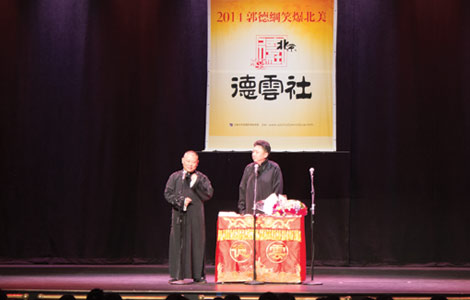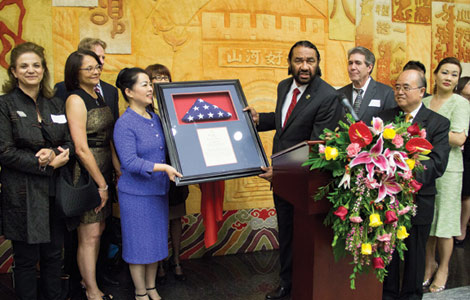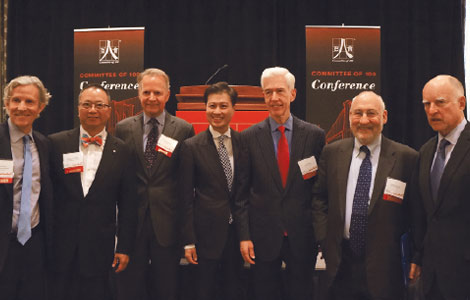Dominic Ng completes term as C-100 chairman
Updated: 2014-04-28 05:29
By
CHEN JIA in San Francisco
(China Daily USA)
|
||||||||
Busy, interesting and rewarding. That's how Dominic Ng who completed his three-year term as chairman of the Committee of 100 (C-100) described his role in the organization that focuses on building constructive relations between the world's two largest economies.
Looking back on his term, Ng said in an interview with China Daily on April 25 in San Francisco that he had regrets every day because C-100 should "have more resources to do more" for building the constructive relationship between the United States and China.
|
 Dominic Ng, outgoing Chairman of Committee of 100 and President and CEO of the East West Bank, uses "busy, interesting and rewarding" to describe his three-year tenure with the national organization of Chinese Americans at its 23rd annual conference on Friday in San Francisco.[Photo by Chang Jun/China Daily]
|
C-100's 23rd Annual Conference was held in the city on April 25-26. Clarence Kwan, a senior partner at Sino-Century China PE Partners, was elected the organization's seventh chairman, succeeding Ng.
"During the past three years, one great accomplishment for C-100 was the public survey about how people from China feel about US, and vice versa," Ng said. "I think that research was well received by not only all the leaders of both great nations but also media."
Another event that he highlighted was that C-100 helped then-US Massachusetts Senator Scott Brown and California Congresswoman Judy Ch get legislation approved expressing a formal regret from Congress on the1882 Chinese Exclusion Act.
"As Chinese Americans, we feel proud that we can get this chapter behind us," he said.
Ng is a native of Hong Kong and lives in Pasadena, California. He got his bachelor's degree from the University of Houston, an honorary doctor of law degree from Occidental College and an honorary fellowship from Lingnan University in Hong Kong.
Before becoming CEO and chairman of East West Bank in 1991, he was a certified public accountant with Deloitte & Touche in Houston and Los Angeles for 10 years.
Los Angeles-based East West Bank is a commercial bank targeting the US and Greater China markets. In 1991, it was a small savings and loan association with $600 million in assets and a market capitalization of $40 million.
Under Ng's leadership, East West Bank has grown to be a full-service commercial bank with assets of $27.4 billion, and capitalization of $5.2 billion. According to Forbes.com, East West Bank has been ranked in the top 10 of the "100 Best Banks" in America between 2010 and 2013.
As a major speaker on US-China relations, Ng has been frequently invited to China and has met with national leaders. Last fall, on a trip to China with other members of C-100, he met with Chinese Premier Li Keqiang, who Ng called a "global, international leader".
In the spring of 2012, he met with Chinese President Xi Jinping, who impressed Ng as a "charismatic", "charming" leader, who also could be "very personable".
Through talks with Chinese leaders, Ng said he has a better understanding about the challenges and opportunities that China and the US face.
China and the US should continue to engage with one another because the results so far have been positive, Ng said. "Though there are always a lot of economic and political issues that may call us to disagree, both President Obama and President Xi are very much interested in getting to talk to each other as often as possible," he said.
Ng said that from a challenge point of view, the US strategy toward the Asia-Pacific region is going to be a change for China, and "I hope that somehow China would be able to find a way to also be part of TPP (Trans-Pacific Partnership)".
Ng called on the Chinese Americans to get more involved with community affairs and pay more attention to civic and public affairs.
"I see more progress in the attitude and political awakening among the Chinese community, particularly the younger American Chinese who are substantially more interested in not only getting involved with politics, but also public service," he said.
More Chinese Americans are able to put their career in public life, participate in the political process and enter mainstream American society, he said.
For example, he said, SCA5 is a very good controversial issue, a very good "wake-up call" for Asian Americans thinking about "if you really want to protect your interest, you need to be actively involved in the political process", he said.
SCA5 was a proposed amendment to California's constitution that would have eliminated the state's Proposition 209 ban on the use race, sex, color, ethnicity, or national origin in recruitment, admissions, and retention programs at the state's public universities and colleges. The state Senate passed the bill but it was but was withdrawn because of lack of support in the state Assembly.

 Chinese comedian gets Broadway laughing
Chinese comedian gets Broadway laughing
 Dominic Ng completes term as C-100 chairman
Dominic Ng completes term as C-100 chairman
 Farewell held for Xu
Farewell held for Xu
 C-100's annual meeting focuses on China's reforms
C-100's annual meeting focuses on China's reforms
 China will not be 'intimidated': envoy
China will not be 'intimidated': envoy
 Amazing manhole cover graffitos dazzle campus
Amazing manhole cover graffitos dazzle campus
 Pro-Russian protesters occupy TV building in eastern Ukraine
Pro-Russian protesters occupy TV building in eastern Ukraine
 Cars with colorful cartoon drawings parade in Hangzhou
Cars with colorful cartoon drawings parade in Hangzhou
Most Viewed
Editor's Picks

|

|

|

|

|

|
Today's Top News
C-100 holds 23rd annual convention
Xi named again in Time's top 100 list
It's lights out for US TV series ordered off sites
Rethinking ink in Chinese modern art
An ex-warrior embraces a US-China 'partnership'
Huawei executive says it still seeks US sales
Huawei executive says it still seeks US sales
Rethinking ink
US Weekly

|

|





